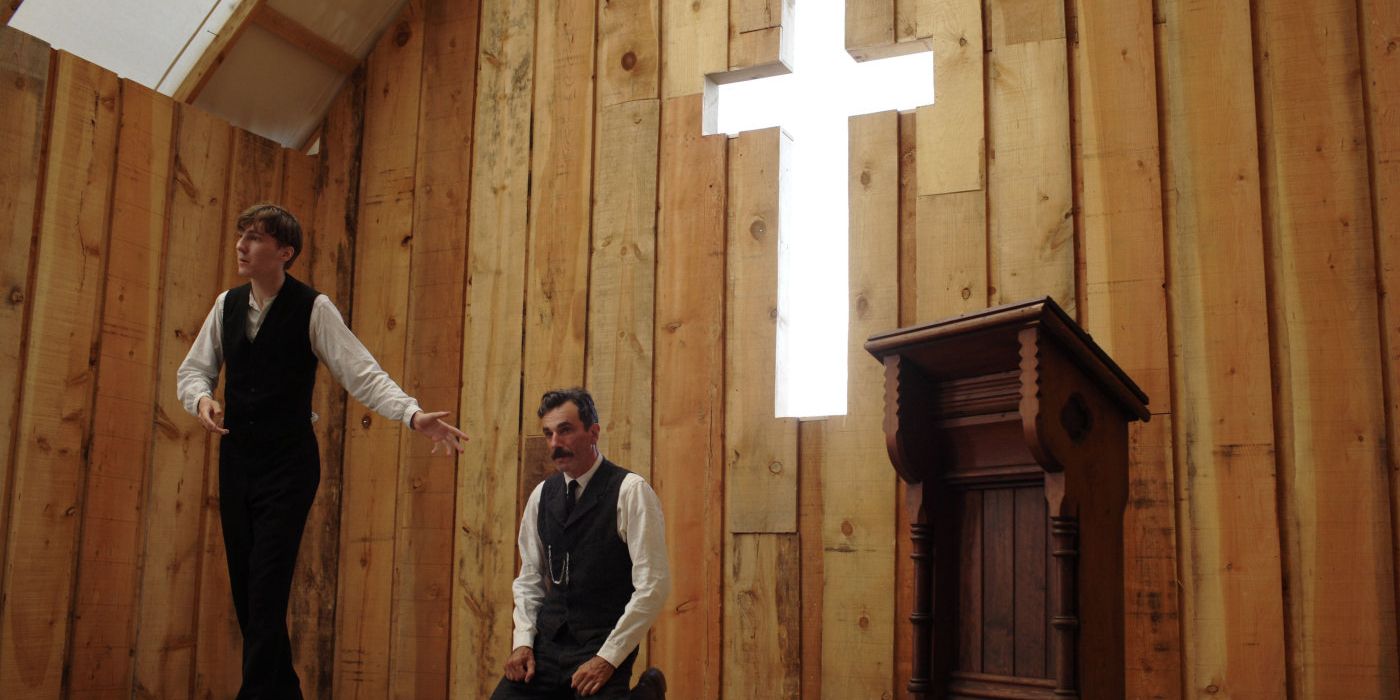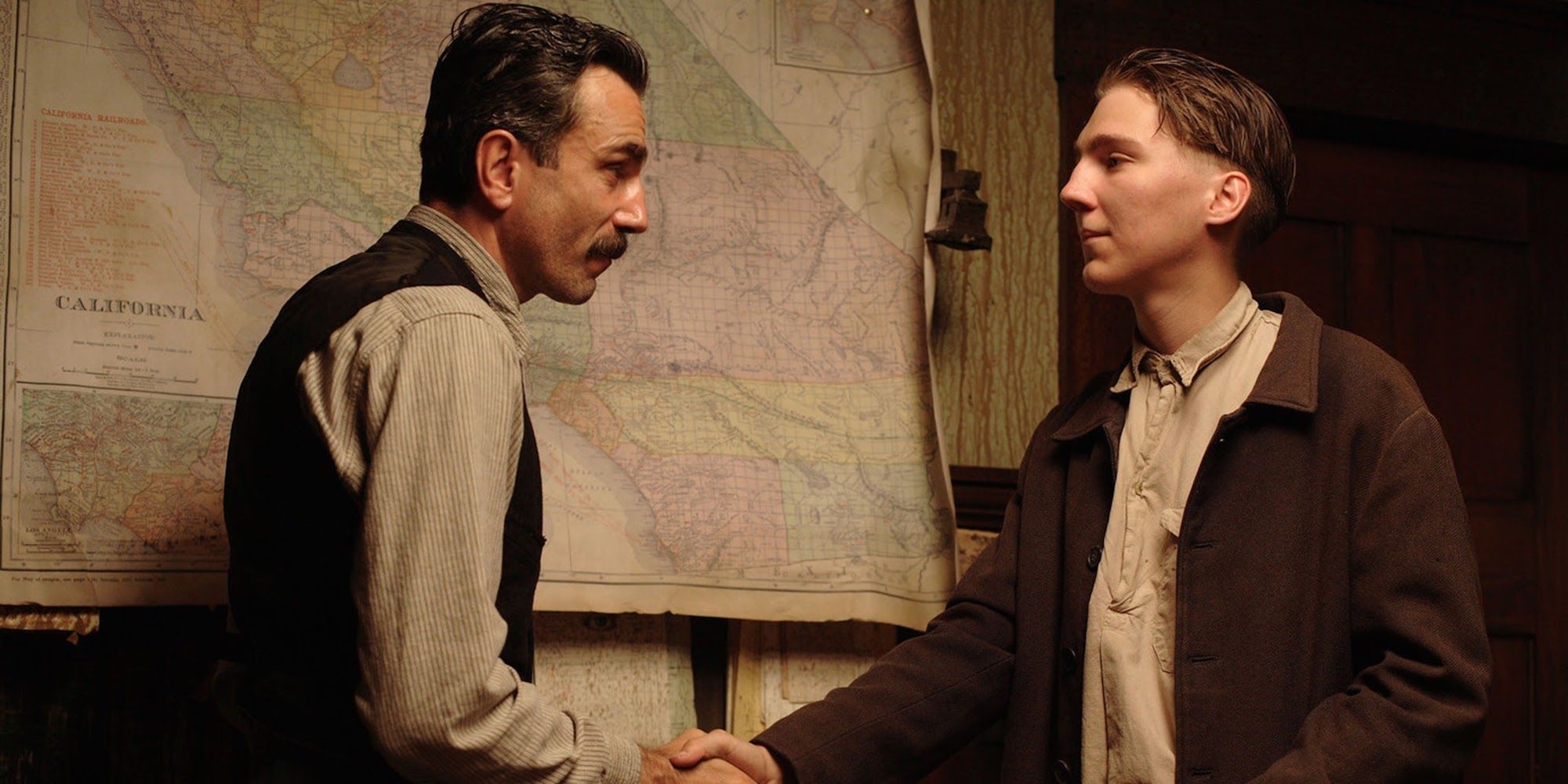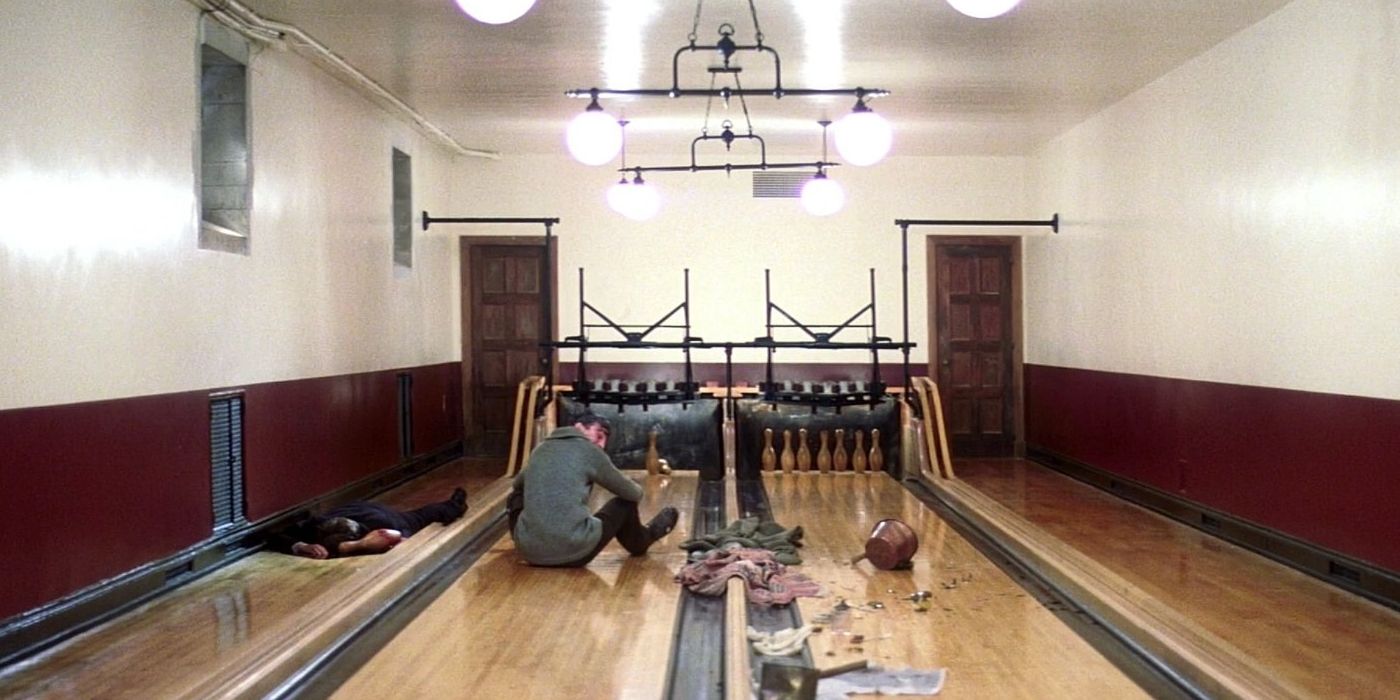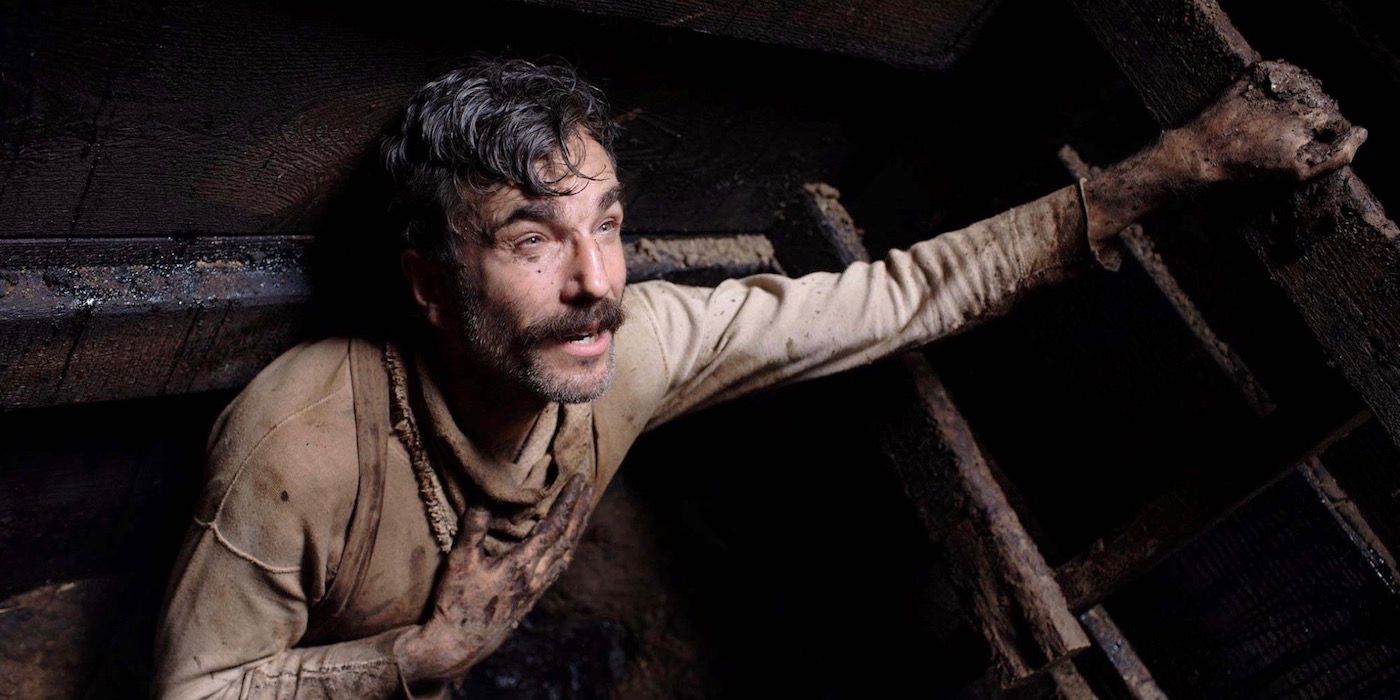There Will Be Blood is often regarded as one of the most ambitious and culturally significant films of the 2000s. However, the film’s most famous scene is often considered a joke despite its disturbing implications. The moment when the central character, Daniel Plainview (Daniel Day-Lewis), exclaims, “I drink your milkshake!” became a popular meme when taken out of context. However, the scene is a deeply layered, dark parody of America’s relationship with capitalism and religion.
There Will be Blood is based on the Upton Sinclair novel Oil!, and it stars Daniel Day-Lewis as an oilman who travels from town to town, bleeding them dry before moving on and leaving them mostly ᴅᴇᴀᴅ in his wake. While an epic period drama, it is also easily seen as a horror movie, with Day-Lewis’s Daniel Plainview seen almost like a vampire sucking the blood (oil) from towns until nothing is left but a corpse. That makes this line and the final scene in the movie so disturbing.
Where Did ‘I Drink Your Milkshake’ Come From?
A Real-Life Senator Used This Quote
Paul Thomas Anderson said that the “milkshake” speech was based on real-life testimony by New Mexico Republican Senator Albert Fall, who was under Congressional investigation for accepting bribes from oil companies in exchange for granting secret leases for federal land (via L.A. Weekly). The event, known as the Teapot Dome scandal, showed how easily capitalism could lead to corruption and inspired Upton Sinclair’s satirical novel Oil!
It’s no surprise that Anderson partially based his screenplay on Sinclair’s work, despite the narrative differences between the two stories. It may seem strange that Senator Fall, in the midst of what was otherwise a densely worded legal proceeding, used such a random, childlike metaphor to explain oil drainage, but this is why Anderson was attracted to the image.
The filmmaker knew how ridiculous the wording sounded yet how effectively it could illustrate the inherent cruelty and ruthlessness of an oil baron’s quest for his liquid gold. Couple that with Daniel Day-Lewis’s ferociously mad performance and Paul Dano’s pitiful reaction, and it’s easier to see why the quote became so recognizable.
Daniel’s Fake Baptism and Eli’s Confession Explained
Eli Wants To Humiliate Daniel In Front Of The Town
To understand the weight of There Will Be Blood‘s final scene, it’s necessary to look back at an equally crucial scene earlier in the movie when Daniel receives baptism from Eli (Dano). Daniel’s violent confrontation with the preacher stems from their contentious relationship, established during their first interaction when Eli demands more money for the land his brother Paul initially offered Daniel. The two come to verbal and physical blows throughout the film to demonstrate their power struggles.
While Daniel convinces the local community to work on his newly acquired land, the prospector must contend with Eli’s church services influencing his workforce. Daniel sees this religious intervention as a threat to his monopoly on power, especially because Eli uses his charisma and influence over his congregation to undermine Daniel’s authority. Eli seizes the opportunity to dominate his rival when industrial accidents expose Daniel’s immorality, but Daniel becomes violent and enraged when his pride is threatened.
Daniel isn’t participating in the baptism because he feels legitimate regret for his sinful acts.
The ruthless oil baron physically ᴀssaults Eli when the preacher confronts him about his missteps. The baptism scene is when Eli can comfortably claim total dominance over Daniel. The ritual serves as a performance for Eli to humiliate Daniel in retaliation for abusing his power. Daniel isn’t participating in the baptism because he feels legitimate regret for his sinful acts but because it’s the only way William Bandy (Colton Woodward) will allow him to claim his land for pipeline construction.
When Eli makes Daniel admit to abandoning his boy and slaps the devil out of him, Daniel internally vows revenge against his nemesis. Years later, Daniel makes Eli admit his hypocrisy as a conning televangelist when the preacher offers the Bandy land rights to him.
The Milkshake Speech Epitomizes Daniel’s Capitalist Expansion
Daniel Uses It To Further Humiliate Eli
The milkshake speech is the culmination of Daniel’s experiences throughout the movie and represents the character’s intentions. It’s the peak of his ruthlessness and demonstrates his philosophy regarding compeтιтion. The baptism scene spurred his even more cutthroat commitment to expansion and inspired his vengeful act of cruelty. Daniel eliminates Eli as a threat to his power and revels in the preacher’s groveling. Eli’s confession may occur in a mansion instead of a church, but his lamentations give Daniel the pleasure of turning the tables.
Daniel isn’t content with accepting Eli’s forced apology in this case. He also admits to stealing the Bandy oil that Eli offered him, further flexing his dominance by explaining oil drainage and his strategic maneuver with the juvenile milkshake imagery. Daniel sees his enemies not on equal footing but as victims to crush under his heel. To the baron, the preacher is no more than a naive and stupid child who leaves his delicious, sugary drink unprotected from smarter, more experienced men, worthier of the prize.
The film’s concluding section reveals that he has become an alcoholic
The recurring imagery of liquid plays a significant role in explaining the unbridled capitalism at the heart of There Will Be Blood. Daniel’s search for oil leads to his immense wealth, but the film’s concluding section reveals that he has become an alcoholic, literally drunk with power. The baptism water represents his ability to turn his defeats into power plays. Daniel abandons his child, but he embraces his lack of compᴀssion as strength and forтιтude and metaphorically basks in his oil fortune through his drinking habit.
Why Daniel Kills Eli
Daniel Knows He Can Show No Weakness
Daniel’s murder of his arch-nemesis is the result of his cutthroat atтιтude towards other people, as his callousness leads to murder. His behavior may seem wild and exaggerated, but considering Daniel’s previous actions, his violence makes sense. He killed his false brother because he felt betrayed, disowned his son because he felt threatened by his business ventures, and finally brutalized Eli as an act of revenge – the culmination of a whole scene that is essentially about vengeance.
Daniel’s company and Eli’s religion viciously fight against each other.
Daniel’s ability to claim victory over his enemy even ties back to the movie’s first scene, in which the prospector crawls to an ᴀssay office with a broken leg to certify his discovered silver properly. To the capitalist, weakness is non-negotiable. Money motivates both Daniel and Eli to strictly abide by their respective worldviews. Daniel’s company and Eli’s religion viciously fight against each other. The irony is that they both stem from the same motivations and pose a threat to each other’s existence.
The two characters seek to gain power and capital through private enterprise, but one of the two forces must eventually destroy the other. Daniel’s brand of capitalism and his stranglehold over natural resources ultimately defeat Eli’s manipulative religious fervor. It’s no accident that There Will Be Blood came out towards the end of the Bush era when it became more apparent than ever that the president’s administration was using the struggle against radical religion as a justification to expand business interests in the oil industry.
From the film’s тιтle to the poster depicting an oil well in the shape of a cross, the story extensively explores the tensions between forces of power at the turn of the American century. Daniel Plainview’s famous milkshake moment may still seem insane, but it illustrates how the country’s richest and most powerful people become so successful.
How There Will Be Blood’s Ending Was Received
The Movie Remains A Masterpiece
While There Will Be Blood fell to No Country For Old Men at the Oscars for Best Picture and Best Director, both films remain highly respected and beloved modern-day masterpieces. Critics praised the film, with a 91% Certified Fresh Rotten Tomatoes score, and the audience score was high as well, at 86%. One audience member wrote, “The two stars of the film both delivered the best acting performances of their career and left no stone un-turned. Ultimately this movie is a genius story of how greed destroys us.“
When discussing There Will Be Blood, critic Roger Ebert praised the film’s ending by comparing it to another classic masterpiece, writing:
“The addition of Plainview’s alleged half-brother (Kevin J. O’Connor) into this equation gives Plainview, at last, someone to confide in, although he confides mostly his universal hatred. That Plainview, by now a famous multimillionaire, would so quickly take this stranger at his word is incredible; certainly we do not. But by now Plainview is drifting from obsession through possession into madness, and at the end, like Kane, he drifts through a vast mansion like a ghost.”
There was also a Reddit thread discussing the There Will Be Blood ending and the final confrontation between Daniel and Eli. Redditor Kill4uhKlondike believed that Daniel was only saying things that he felt hurt Eli, even if they were not all true. They wrote, “Daniel seems to revel in cutting people that he despises down by attacking their most prevalent character qualities/values… I think Daniel was just trying to hurt Eli as much as possible. It allows him to pick apart Eli when he’s at his most vulnerable.“









